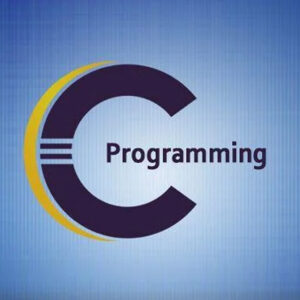
Overview
C is a foundational, high-level programming language known for its efficiency and performance. It is widely used for developing operating systems, embedded systems, and system-level applications. C provides low-level memory access, making it ideal for hardware-oriented programming. Its simplicity and portability have made it a popular choice for beginners and professionals alike.
Study Mode:
Duration:
Curriculum For:
Batch Seats:
Learning outcomes
- Understand the basic syntax, structure, and data types of the C language.
- Develop problem-solving skills using C programming concepts.
- Write efficient programs using control structures like loops and conditionals.
- Implement functions and modular programming techniques in C.
- Manage memory effectively using pointers and dynamic memory allocation.
- Apply file handling operations to read and write data in C programs.
Career information
C programming provides a strong foundation for careers in software development, embedded systems, and system programming. It is essential for building operating systems, compilers, and low-level applications. C skills are highly valued in industries like telecom, IoT, robotics, and hardware design. Mastery of C also supports career growth in software engineering and technical problem-solving roles.
Career Path
- Embedded Systems Developer
- System Software Engineer
- Firmware Engineer
- IoT Developer
- Application Developer
Program SYLLABUS
C Programming Course
| Module 1: Introduction to C Programming |
|---|
| History and Features of C |
| Setting Up the Development Environment (Turbo C / GCC / VS Code) |
| Structure of a C Program |
| Compilation & Execution Process |
| Understanding Header Files and Libraries |
| Module 2: Basics of C |
|---|
| Variables and Data Types |
| Keywords and Identifiers |
| Constants and Literals |
| Input/Output Functions (scanf(), printf()) |
| Operators (Arithmetic, Relational, Logical, Assignment) |
| Module 3: Control Flow Statements |
|---|
| if, if-else, nested if |
| switch-case Statements |
| Loops: for, while, do-while |
| break, continue, and goto |
| Module 4: Functions in C |
|---|
| Function Declaration, Definition, and Calling |
| Types of Functions |
| Call by Value vs Call by Reference |
| Recursion |
| Scope and Lifetime of Variables |
| Module 5: Arrays and Strings |
|---|
| 1D and 2D Arrays |
| Array Operations (Searching, Sorting) |
| Introduction to Strings |
| String Handling Functions (strlen, strcpy, strcat, etc.) |
| Arrays of Strings |
| Module 6: Pointers in C |
|---|
| Introduction to Pointers |
| Pointer Arithmetic |
| Pointers with Arrays |
| Pointers with Functions |
| Pointer to Pointer |
| Pointers and Strings |
| Module 7: Structures and Unions |
|---|
| Defining and Using Structures |
| Array of Structures |
| Nested Structures |
| Pointer to Structures |
| Union vs Structure |
| typedef Keyword |
| Module 8: File Handling in C |
|---|
| Opening and Closing Files |
| Reading and Writing to Files (fopen, fclose, fscanf, fprintf, etc.) |
| File Modes |
| File Operations with Structures |
| Random Access to Files (fseek, ftell, rewind) |
| Module 9: Dynamic Memory Allocation |
|---|
| malloc(), calloc(), realloc(), free() |
| Memory Leak and Management |
| Use of Pointers in DMA |
| Building Dynamic Arrays and Strings |
| Module 10: Command Line Arguments |
|---|
| argc and argv[] |
| Parsing Command-Line Input |
| Mini Projects using Command-Line Parameters |
| Module 11: Debugging and Error Handling |
|---|
| Common Compilation Errors |
| Logical & Runtime Errors |
| Use of Debuggers (GDB) |
| Writing Robust Code with Defensive Programming |
